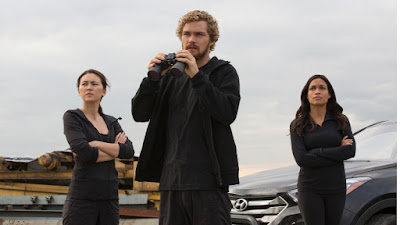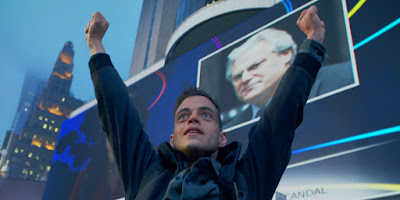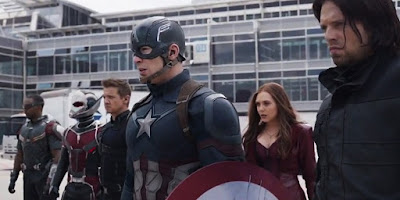TV Review: Marvel's Iron Fist - Season 1
As the road towards this summer's highly-anticipated Defenders series continues, the latest collaboration of Netflix and Marvel Studios was set to be the defining chapter of the gritty super-powered street heroes on the small screen. With Marvel's Iron Fist introducing us to a character said to be just as powerful as Doctor Strange, the possibilities of just how mystical this series could be seemed almost endless. Then again, when it comes to small screen efforts such as this, the amounts of visual splendor and grandiose storytelling of course have their limits. While Iron Fist may work as a dynamic new counterpart to the other Marvel-Netflix series on some levels, the show never manages to elevate itself to something more than simply cookie-cutter storytelling and stale character development.
Fifteen year after 10-year old Danny Rand experiences a tragic plane crash that claims the lives of both his mother and father, he returns to his home in New York City only to find the life he knew completely washed away. With his family now gone, and his parents' multimillion-dollar company under new management, Rand (Finn Jones) is met with a rather rude homecoming as he struggles to reclaim the life he left behind. Spending the last fifteen years of his life raised by the monks of an ancient civilization known as K'un-Lun, Danny must now tackle not only the dangerous terrain of New York, but also the mystical new power within him, known as the Iron Fist. With powerful forces against him, from his childhood friends and coworkers to deadly assassins, Danny Rand must discover the line between being a hero of his city and an uncontrollable living weapon.
As the penultimate chapter in the Marvel-Netflix line-up, leading up to this summer's team-up series, Marvel's The Defenders, Marvel's Iron Fist introduced audiences to yet another troubled character with a spectacular amount of potential just waiting to be uncovered. With the character of Iron Fist and his story shaping up to be the perfect way to transition fans of previous grounded Marvel-Netflix collaborations like Daredevil and Luke Cage, into a whole new world of super-powered excitement, there were a number of places I expected this show to go. In the end, while the character of millionaire orphan Danny Rand might harbor some spectacular abilities and storylines in his comic-book origins, the fourth layer in the Marvel Netflix fold felt almost lazy when it came to delivering anything truly ground-breaking.
While the series felt almost like an odd mix of the CW's Arrow and one slice out of a decent kung-fu movie, the show still managed to draw me in with a number of intriguing elements. Apart from its mystical martial-arts-focused action, the lead character of orphan Danny Rand was a major factor in my decision to check out the series. With the first Netflix-Marvel collaboration introducing us to Charlie Cox's suave yet haunted lawyer Matt Murdock back in 2015, I saw a similar likeness in Danny Rand, played by Game of Thrones actor Finn Jones. With a charming, boyish exterior mixed with a hardened past of tragedy within, my thoughts automatically sprung to one question: How will they make these street-level heroes all distinctive in their own way? And more importantly, how will Rand differ from Murdock? While I'll touch on the tone of each of the four series soon, the question of how Jones' orphaned kung-fu fighter would establish himself in this series spun in my mind constantly throughout the series.
Looking at the series as a whole now that I have watched it and gave it some thought, the fourth tier in the Defenders build-up felt almost like a bad season of a great show. With the previous Netflix series establishing their dark, broken characters each in their own way, it was unclear just how well Iron Fist would build off of that. With each series before it having its own fascinating tone and characters that worked to fuel the story -- Daredevil being a legal drama mixed with crime thriller, Jessica Jones turning into a sort-off psychological thriller about PTSD, and Luke Cage working as a very stylized story of redemption -- Iron Fist was left almost scarce of any true tone. Yes, while its theme of advanced martial arts and reclaiming one's past might have been compelling on some level, the show was majorly derailed by its lack of focus. Wanting to be one thing, while also being another, the show's numerous storylines failed to merge into anything significantly coherent.
The show's cast, while still massively flawed, was a redeeming quality for me. While I might have lost interest in Finn Jones' portrayal of Danny Rand many times in the series, the show did manage to make him somewhat likable. Still, while we might get a brief glimpse of the horrors he faced as a child, and the subsequent disciplined lifestyle he was raised into, Danny's return to his home in New York never felt compelling enough to follow closely. Once Jones' character transformed from a disciplined monk to a whiny teenager, the show never really attempted to reel him back in. While the character surely wasn't a completely wasted effort by the show's creators, hopefully the show-runners of The Defenders will be able to whip Danny into the more sophisticated warrior he's meant to become.
As for the rest of the cast, there were only a handful of performances that really stood out to me. While the childhood friends of Danny's, Ward and Joy Meachum (played by Tom Pelphrey and Jessica Stroup respectively), might have been some of the weaker characters of the show, Pelphrey's semi-cynical, semi-psychopathic performance did deserve a mention. Stroup, while fantastic in Fox's The Following, offered little to no emotion to make her character at all compelling. Working as a unique companion to Finn Jones' whiny performance as Rand, however, was Jessica Henwick's charismatic fighter Colleen Wing, whose hard-edged demeanor lent itself to become one of the show's most memorable performances.
Moving along, the series also had a very evident villain problem. Much like its sporadic take on establishing a clear tone, the show feverishly scrambled to find an antagonist that actually worked in the story they were trying to tell. While Daredevil and Jessica Jones managed to mature their individual antagonists beyond simple stereotypes -- and Luke Cage establishing a great one only to waste him -- Iron Fist sprawled constantly between villains for the majority of the season. While I expected Danny's sort-of uncle-turned-backstabbing-corporate-dog Harold Meachum (David Wenham) to be the season's central baddie, the show turned the tables more than once, delivering a number of scheming, mustache-twerling villains. From Daredevil's accomplished drug kingpin Madame Gao to Ramon Rodriquez's corrupted sensei Bakuto, the show felt like it was always gambling to see what villain could outsmart the hero quicker. Predictable and somewhat cliche, the only ones outsmarted here were the show's writers.
Overall, while Marvel's latest Netflix endeavor might not have fared well in comparison to its previous entries, there are still a number of redeeming qualities to be found in Iron Fist. Unfortunately, if you're seeking a masterful, character-driven tale of ground-breaking martial arts, you'll have to settle for a bit more corporate espionage than kung-fu. While Iron Fist's poor reception may not have made this season anything to cheer about, I do believe there is a lot of untaped potential left for the character as he begins to interact with some of Marvel's most compelling and gritty characters.
I gave Marvel's Iron Fist a 6 out of 10, because even with eye-popping action and a sliver of relatable quality, the show's misguided corporate focus and lack of character development left the show in the shadow of its far more interesting predecessors.
Looking at the series as a whole now that I have watched it and gave it some thought, the fourth tier in the Defenders build-up felt almost like a bad season of a great show. With the previous Netflix series establishing their dark, broken characters each in their own way, it was unclear just how well Iron Fist would build off of that. With each series before it having its own fascinating tone and characters that worked to fuel the story -- Daredevil being a legal drama mixed with crime thriller, Jessica Jones turning into a sort-off psychological thriller about PTSD, and Luke Cage working as a very stylized story of redemption -- Iron Fist was left almost scarce of any true tone. Yes, while its theme of advanced martial arts and reclaiming one's past might have been compelling on some level, the show was majorly derailed by its lack of focus. Wanting to be one thing, while also being another, the show's numerous storylines failed to merge into anything significantly coherent.
The show's cast, while still massively flawed, was a redeeming quality for me. While I might have lost interest in Finn Jones' portrayal of Danny Rand many times in the series, the show did manage to make him somewhat likable. Still, while we might get a brief glimpse of the horrors he faced as a child, and the subsequent disciplined lifestyle he was raised into, Danny's return to his home in New York never felt compelling enough to follow closely. Once Jones' character transformed from a disciplined monk to a whiny teenager, the show never really attempted to reel him back in. While the character surely wasn't a completely wasted effort by the show's creators, hopefully the show-runners of The Defenders will be able to whip Danny into the more sophisticated warrior he's meant to become.
As for the rest of the cast, there were only a handful of performances that really stood out to me. While the childhood friends of Danny's, Ward and Joy Meachum (played by Tom Pelphrey and Jessica Stroup respectively), might have been some of the weaker characters of the show, Pelphrey's semi-cynical, semi-psychopathic performance did deserve a mention. Stroup, while fantastic in Fox's The Following, offered little to no emotion to make her character at all compelling. Working as a unique companion to Finn Jones' whiny performance as Rand, however, was Jessica Henwick's charismatic fighter Colleen Wing, whose hard-edged demeanor lent itself to become one of the show's most memorable performances.
Moving along, the series also had a very evident villain problem. Much like its sporadic take on establishing a clear tone, the show feverishly scrambled to find an antagonist that actually worked in the story they were trying to tell. While Daredevil and Jessica Jones managed to mature their individual antagonists beyond simple stereotypes -- and Luke Cage establishing a great one only to waste him -- Iron Fist sprawled constantly between villains for the majority of the season. While I expected Danny's sort-of uncle-turned-backstabbing-corporate-dog Harold Meachum (David Wenham) to be the season's central baddie, the show turned the tables more than once, delivering a number of scheming, mustache-twerling villains. From Daredevil's accomplished drug kingpin Madame Gao to Ramon Rodriquez's corrupted sensei Bakuto, the show felt like it was always gambling to see what villain could outsmart the hero quicker. Predictable and somewhat cliche, the only ones outsmarted here were the show's writers.
Overall, while Marvel's latest Netflix endeavor might not have fared well in comparison to its previous entries, there are still a number of redeeming qualities to be found in Iron Fist. Unfortunately, if you're seeking a masterful, character-driven tale of ground-breaking martial arts, you'll have to settle for a bit more corporate espionage than kung-fu. While Iron Fist's poor reception may not have made this season anything to cheer about, I do believe there is a lot of untaped potential left for the character as he begins to interact with some of Marvel's most compelling and gritty characters.
I gave Marvel's Iron Fist a 6 out of 10, because even with eye-popping action and a sliver of relatable quality, the show's misguided corporate focus and lack of character development left the show in the shadow of its far more interesting predecessors.







Comments
Post a Comment